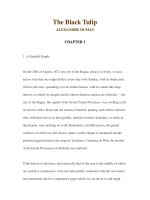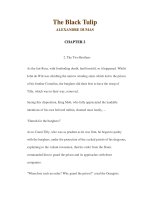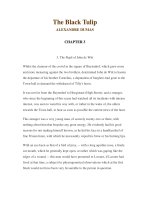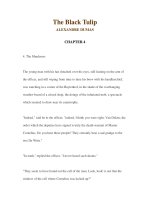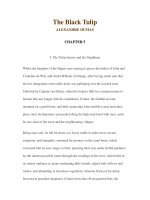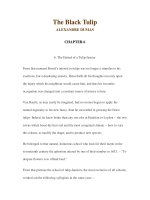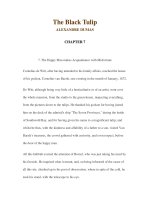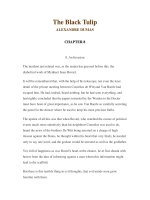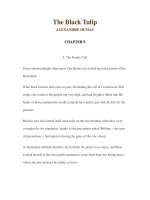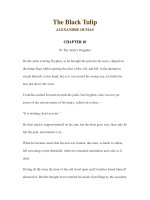LUYỆN ĐỌC TIẾNG ANH QUA CÁC TÁC PHẨM VĂN HỌC –The Black Tulip ALEXANDRE DUMAS CHAPTER 2 pps
Bạn đang xem bản rút gọn của tài liệu. Xem và tải ngay bản đầy đủ của tài liệu tại đây (37.81 KB, 16 trang )
The Black Tulip
ALEXANDRE DUMAS
CHAPTER 2
2. The Two Brothers
As the fair Rosa, with foreboding doubt, had foretold, so it happened. Whilst
John de Witt was climbing the narrow winding stairs which led to the prison
of his brother Cornelius, the burghers did their best to have the troop of
Tilly, which was in their way, removed.
Seeing this disposition, King Mob, who fully appreciated the laudable
intentions of his own beloved militia, shouted most lustily,
"Hurrah for the burghers!"
As to Count Tilly, who was as prudent as he was firm, he began to parley
with the burghers, under the protection of the cocked pistols of his dragoons,
explaining to the valiant townsmen, that his order from the States
commanded him to guard the prison and its approaches with three
companies.
"Wherefore such an order? Why guard the prison?" cried the Orangists.
"Stop," replied the Count, "there you at once ask me more than I can tell you.
I was told, 'Guard the prison,' and I guard it. You, gentlemen, who are almost
military men yourselves, you are aware that an order must never be
gainsaid."
"But this order has been given to you that the traitors may be enabled to
leave the town."
"Very possibly, as the traitors are condemned to exile," replied Tilly.
"But who has given this order?"
"The States, to be sure!"
"The States are traitors."
"I don't know anything about that!"
"And you are a traitor yourself!"
"I?"
"Yes, you."
"Well, as to that, let us understand each other gentlemen. Whom should I
betray? The States? Why, I cannot betray them, whilst, being in their pay, I
faithfully obey their orders."
As the Count was so indisputably in the right that it was impossible to argue
against him, the mob answered only by redoubled clamour and horrible
threats, to which the Count opposed the most perfect urbanity.
"Gentlemen," he said, "uncock your muskets, one of them may go off by
accident; and if the shot chanced to wound one of my men, we should knock
over a couple of hundreds of yours, for which we should, indeed, be very
sorry, but you even more so; especially as such a thing is neither
contemplated by you nor by myself."
"If you did that," cried the burghers, "we should have a pop at you, too."
"Of course you would; but suppose you killed every man Jack of us, those
whom we should have killed would not, for all that, be less dead."
"Then leave the place to us, and you will perform the part of a good citizen."
"First of all," said the Count, "I am not a citizen, but an officer, which is a
very different thing; and secondly, I am not a Hollander, but a Frenchman,
which is more different still. I have to do with no one but the States, by
whom I am paid; let me see an order from them to leave the place to you,
and I shall only be too glad to wheel off in an instant, as I am confoundedly
bored here."
"Yes, yes!" cried a hundred voices; the din of which was immediately
swelled by five hundred others; "let us march to the Town-hall; let us go and
see the deputies! Come along! come along!"
"That's it," Tilly muttered between his teeth, as he saw the most violent
among the crowd turning away; "go and ask for a meanness at the Town-
hall, and you will see whether they will grant it; go, my fine fellows, go!"
The worthy officer relied on the honour of the magistrates, who, on their
side, relied on his honour as a soldier.
"I say, Captain," the first lieutenant whispered into the ear of the Count, "I
hope the deputies will give these madmen a flat refusal; but, after all, it
would do no harm if they would send us some reinforcement."
In the meanwhile, John de Witt, whom we left climbing the stairs, after the
conversation with the jailer Gryphus and his daughter Rosa, had reached the
door of the cell, where on a mattress his brother Cornelius was resting, after
having undergone the preparatory degrees of the torture. The sentence of
banishment having been pronounced, there was no occasion for inflicting the
torture extraordinary.
Cornelius was stretched on his couch, with broken wrists and crushed
fingers. He had not confessed a crime of which he was not guilty; and now,
after three days of agony, he once more breathed freely, on being informed
that the judges, from whom he had expected death, were only condemning
him to exile.
Endowed with an iron frame and a stout heart, how would he have
disappointed his enemies if they could only have seen, in the dark cell of the
Buytenhof, his pale face lit up by the smile of the martyr, who forgets the
dross of this earth after having obtained a glimpse of the bright glory of
heaven.
The warden, indeed, had already recovered his full strength, much more
owing to the force of his own strong will than to actual aid; and he was
calculating how long the formalities of the law would still detain him in
prison.
This was just at the very moment when the mingled shouts of the burgher
guard and of the mob were raging against the two brothers, and threatening
Captain Tilly, who served as a rampart to them. This noise, which roared
outside of the walls of the prison, as the surf dashing against the rocks, now
reached the ears of the prisoner.
But, threatening as it sounded, Cornelius appeared not to deem it worth his
while to inquire after its cause; nor did he get up to look out of the narrow
grated window, which gave access to the light and to the noise of the world
without.
He was so absorbed in his never-ceasing pain that it had almost become a
habit with him. He felt with such delight the bonds which connected his
immortal being with his perishable frame gradually loosening, that it seemed
to him as if his spirit, freed from the trammels of the body, were hovering
above it, like the expiring flame which rises from the half-extinguished
embers.
He also thought of his brother; and whilst the latter was thus vividly present
to his mind the door opened, and John entered, hurrying to the bedside of the
prisoner, who stretched out his broken limbs and his hands tied up in
bandages towards that glorious brother, whom he now excelled, not in
services rendered to the country, but in the hatred which the Dutch bore him.
John tenderly kissed his brother on the forehead, and put his sore hands
gently back on the mattress.
"Cornelius, my poor brother, you are suffering great pain, are you not?"
"I am suffering no longer, since I see you, my brother."
"Oh, my poor dear Cornelius! I feel most wretched to see you in such a
state."
"And, indeed, I have thought more of you than of myself; and whilst they
were torturing me, I never thought of uttering a complaint, except once, to
say, 'Poor brother!' But now that you are here, let us forget all. You are
coming to take me away, are you not?"
"I am."
"I am quite healed; help me to get up, and you shall see how I can walk."
"You will not have to walk far, as I have my coach near the pond, behind
Tilly's dragoons."
"Tilly's dragoons! What are they near the pond for?"
"Well," said the Grand Pensionary with a melancholy smile which was
habitual to him, "the gentlemen at the Town-hall expect that the people at the
Hague would like to see you depart, and there is some apprehension of a
tumult."
"Of a tumult?" replied Cornelius, fixing his eyes on his perplexed brother; "a
tumult?"
"Yes, Cornelius."
"Oh! that's what I heard just now," said the prisoner, as if speaking to
himself. Then, turning to his brother, he continued,
"Are there many persons down before the prison."
"Yes, my brother, there are."
"But then, to come here to me "
"Well?"
"How is it that they have allowed you to pass?"
"You know well that we are not very popular, Cornelius," said the Grand
Pensionary, with gloomy bitterness. "I have made my way through all sorts
of bystreets and alleys."
"You hid yourself, John?"
"I wished to reach you without loss of time, and I did what people will do in
politics, or on the sea when the wind is against them, I tacked."
At this moment the noise in the square below was heard to roar with
increasing fury. Tilly was parleying with the burghers.
"Well, well," said Cornelius, "you are a very skilful pilot, John; but I doubt
whether you will as safely guide your brother out of the Buytenhof in the
midst of this gale, and through the raging surf of popular hatred, as you did
the fleet of Van Tromp past the shoals of the Scheldt to Antwerp."
"With the help of God, Cornelius, we'll at least try," answered John; "but,
first of all, a word with you."
"Speak!"
The shouts began anew.
"Hark, hark!" continued Cornelius, "how angry those people are! Is it against
you, or against me?"
"I should say it is against us both, Cornelius. I told you, my dear brother, that
the Orange party, while assailing us with their absurd calumnies, have also
made it a reproach against us that we have negotiated with France."
"What blockheads they are!"
"But, indeed, they reproach us with it."
"And yet, if these negotiations had been successful, they would have
prevented the defeats of Rees, Orsay, Wesel, and Rheinberg; the Rhine
would not have been crossed, and Holland might still consider herself
invincible in the midst of her marshes and canals."
"All this is quite true, my dear Cornelius, but still more certain it is, that if at
this moment our correspondence with the Marquis de Louvois were
discovered, skilful pilot as I am, I should not be able to save the frail barque
which is to carry the brothers De Witt and their fortunes out of Holland. That
correspondence, which might prove to honest people how dearly I love my
country, and what sacrifices I have offered to make for its liberty and glory,
would be ruin to us if it fell into the hands of the Orange party. I hope you
have burned the letters before you left Dort to join me at the Hague."
"My dear brother," Cornelius answered, "your correspondence with M. de
Louvois affords ample proof of your having been of late the greatest, most
generous, and most able citizen of the Seven United Provinces. I rejoice in
the glory of my country; and particularly do I rejoice in your glory, John. I
have taken good care not to burn that correspondence."
"Then we are lost, as far as this life is concerned," quietly said the Grand
Pensionary, approaching the window.
"No, on the contrary, John, we shall at the same time save our lives and
regain our popularity."
"But what have you done with these letters?"
"I have intrusted them to the care of Cornelius van Baerle, my godson,
whom you know, and who lives at Dort."
"Poor honest Van Baerle! who knows so much, and yet thinks of nothing but
of flowers and of God who made them. You have intrusted him with this
fatal secret; it will be his ruin, poor soul!"
"His ruin?"
"Yes, for he will either be strong or he will be weak. If he is strong, he will,
when he hears of what has happened to us, boast of our acquaintance; if he is
weak, he will be afraid on account of his connection with us: if he is strong,
he will betray the secret by his boldness; if he is weak, he will allow it to be
forced from him. In either case he is lost, and so are we. Let us, therefore,
fly, fly, as long as there is still time."
Cornelius de Witt, raising himself on his couch, and grasping the hand of his
brother, who shuddered at the touch of his linen bandages, replied,
"Do not I know my godson? have not I been enabled to read every thought in
Van Baerle's mind, and every sentiment in his heart? You ask whether he is
strong or weak. He is neither the one nor the other; but that is not now the
question. The principal point is, that he is sure not to divulge the secret, for
the very good reason that he does not know it himself."
John turned round in surprise.
"You must know, my dear brother, that I have been trained in the school of
that distinguished politician John de Witt; and I repeat to you, that Van
Baerle is not aware of the nature and importance of the deposit which I have
intrusted to him."
"Quick then," cried John, "as there is still time, let us convey to him
directions to burn the parcel."
"Through whom?"
"Through my servant Craeke, who was to have accompanied us on
horseback, and who has entered the prison with me, to assist you
downstairs."
"Consider well before having those precious documents burnt, John!"
"I consider, above all things, that the brothers De Witt must necessarily save
their lives, to be able to save their character. If we are dead, who will defend
us? Who will have fully understood our intentions?"
"You expect, then, that they would kill us if those papers were found?"
John, without answering, pointed with his hand to the square, whence, at that
very moment, fierce shouts and savage yells made themselves heard.
"Yes, yes," said Cornelius, "I hear these shouts very plainly, but what is their
meaning?"
John opened the window.
"Death to the traitors!" howled the populace.
"Do you hear now, Cornelius?"
"To the traitors! that means us!" said the prisoner, raising his eyes to heaven
and shrugging his shoulders.
"Yes, it means us," repeated John.
"Where is Craeke?"
"At the door of your cell, I suppose."
"Let him enter then."
John opened the door; the faithful servant was waiting on the threshold.
"Come in, Craeke, and mind well what my brother will tell you."
"No, John; it will not suffice to send a verbal message; unfortunately, I shall
be obliged to write."
"And why that?"
"Because Van Baerle will neither give up the parcel nor burn it without a
special command to do so."
"But will you be able to write, poor old fellow?" John asked, with a look on
the scorched and bruised hands of the unfortunate sufferer.
"If I had pen and ink you would soon see," said Cornelius.
"Here is a pencil, at any rate."
"Have you any paper? for they have left me nothing."
"Here, take this Bible, and tear out the fly-leaf."
"Very well, that will do."
"But your writing will be illegible."
"Just leave me alone for that," said Cornelius. "The executioners have indeed
pinched me badly enough, but my hand will not tremble once in tracing the
few lines which are requisite."
And really Cornelius took the pencil and began to write, when through the
white linen bandages drops of blood oozed out which the pressure of the
fingers against the pencil squeezed from the raw flesh.
A cold sweat stood on the brow of the Grand Pensionary.
Cornelius wrote:
"My dear Godson,
"Burn the parcel which I have intrusted to you. Burn it without looking at it,
and without opening it, so that its contents may for ever remain unknown to
yourself. Secrets of this description are death to those with whom they are
deposited. Burn it, and you will have saved John and Cornelius de Witt.
"Farewell, and love me.
"Cornelius de Witt
"August 20th, 1672."
John, with tears in his eyes, wiped off a drop of the noble blood which had
soiled the leaf, and, after having handed the despatch to Craeke with a last
direction, returned to Cornelius, who seemed overcome by intense pain, and
near fainting.
"Now," said he, "when honest Craeke sounds his coxswain's whistle, it will
be a signal of his being clear of the crowd, and of his having reached the
other side of the pond. And then it will be our turn to depart."
Five minutes had not elapsed, before a long and shrill whistle was heard
through the din and noise of the square of the Buytenhof.
John gratefully raised his eyes to heaven.
"And now," said he, "let us off, Cornelius."
